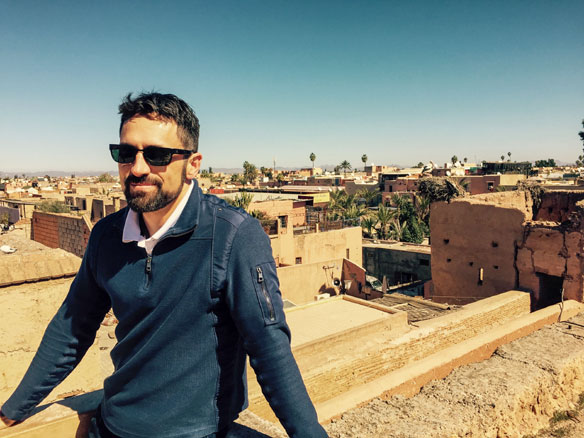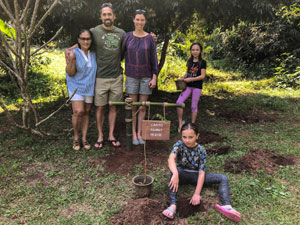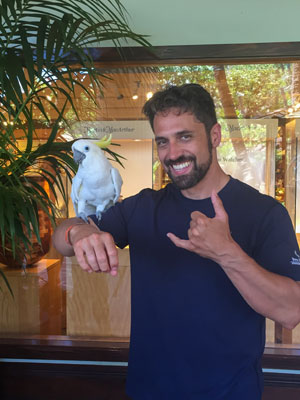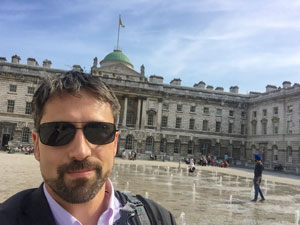
Recognizing the strategic inflection point
A Conversation with Flight Centre Travel Group's Marc Casto

BOB MOWAT
In a wide-ranging conversation with Canadian Travel Press, Flight Centre Travel Group’s (FCTG) president, Leisure Brands, Americas Division, Marc Casto talks about how embracing the unknown and recognizing that the path to a successful resolution is paved frequently by an iterative process of trial and error.
Maybe you can start by talking about Flight Centre Travel Group’s (FCTG) recently implemented “retail transformation” and what it’s all about? And, perhaps, how COVID-19 will impact on your ability to oversee the implementation and day-to-day execution of the new model? That must be a bit challenging.

Casto and wife, Julia skiing
This has clearly been the year of challenges for all industries, travel near the front of that list. Coming into 2020 we already knew that the retail experience required a reimagining; the challenges over the last few months forced us to distill our plans and execute upon this new vision for FCTG.
Our company has always had a People-First Policy: all solutions need to be convenient for the client and supportive of the consultant. Our transformation retains that at its core while recognizing the industry has inexorably changed post the coronavirus.
While historically FCTG Leisure has been built upon a retail store first strategy, we are migrating to a series of network hubs serving concentrations of clients and agents alike. This reimagining will allow us to support a greater reach of clients, be it in person, virtual, or by video.
The Network Hub is much more than a congregation point for virtual and physical agents. Each Network hub will serve as the locus for the implementation of core technology which completely re-envisions the client-agent-supplier triad of communication and service. Likewise, each will be supported by creative marketing efforts to enable the growth of business for agent and independent contractor alike. Finally, the Network hubs will host innovation labs highlighting the next generation of travel disruptors.
Of course, implementing this program would be ideally done in person. As soon as the curtain on travel is lifted, I will be working on premise with all teams to ensure we meet our implementation targets.
Flight Centre’s new model seems to have anticipated some of the changes that COVID-19 has presented the travel industry with. How do you see retail travel moving forward as the world reopens?

Casto and family – his mother, Maryles is on the left; with wife, Julia and his two daughters, Elenora (seated) and Abigail.
In a world of Covid-19 there will be a reduced amount of walk in traffic, particularly to collect sanitized brochures. Having a retail experience designed around the exchange of physical materials, particularly after all industries have become familiar with operating virtually, would be tone deaf to the times.
To be abundantly clear, though, retail travel will exist and thrive. As it was post 9/11, there will be the desire by clients to not only transact but also to be educated on the new way of travelling. Our clients have already expressed their desire in a more consultative approach, with safety and security top of mind. For many travellers, this is best served with a retail solution.
Everyone is doing modelling these days, and I’m just wondering if you can give Canadian Travel Press’ readers an idea of how you see the industry recovering? Is the expectation that it will one day return to “business as usual” or should retailers start looking at ways to do “business as unusual?”
Former CEO of Intel Andy Grove coined the term Strategic Inflection Point (SIP). This is an event or time where business as usual cannot, and must not, continue. Any firm that fails to recognize a SIP will become a historical relic. The coronavirus is clearly a SIP: there will be no business as usual as the travel experience has changed and will not return to its prior form.
 Some of the changes are clearly evident: the focus upon cleanliness standards and social distancing; the necessity of video-conferencing; the requirement of ubiquitous wifi; the necessity of flexible work environments; and, the rise of mobile commerce to name but a few. Other elements are still in development and will only become clear years from now. This certainly includes travel industry suppliers, buying habits, payment systems, work rules, and much more.
Some of the changes are clearly evident: the focus upon cleanliness standards and social distancing; the necessity of video-conferencing; the requirement of ubiquitous wifi; the necessity of flexible work environments; and, the rise of mobile commerce to name but a few. Other elements are still in development and will only become clear years from now. This certainly includes travel industry suppliers, buying habits, payment systems, work rules, and much more.
This change, though, presents an extraordinary opportunity for forward looking individuals and teams.
If it’s “business as unusual,” what will retailers have to do to, not just survive, but to succeed. And where do you see FCTG fitting? What’s it bringing to the market that will set it apart from others in the retail travel space?
Not to sound corny, but the critical factor necessary for all retailers in this new world environment is to become familiar with change, to embrace the unknown, and recognize that the path to a successful resolution is paved frequently by an iterative process of trial and error.
A critical element for me is to encourage a more Agile environment within our Leisure operations. Specifically, we need to create the space for innovation to occur. This is not a top-down approach but one that encourages teams to sample new solutions and learn from their failings. By application of a continuous feedback loop, and through input from vested parties, we can identify the unknown and provide solutions presently not even dreamed of.
Let’s talk about consumers. There is all sorts of surveying going on right now and while intentions to travel have nudged up a little, consumers are still nervous. What do you think the industry is going to have to do make them confident that they’ll be safe when they take a vacation?
While many point to a vaccine as the necessary factor for the resumption of travel, and while it will certainly help tremendously, I do not believe that is the necessary factor. Realistically, a vaccine is likely one year out, but I believe we will see a material resumption in travel before then.
Upon the reduction in regulations that prohibit or severely restrict movement, I anticipate travel to return in three waves:
 The affluent: already we are seeing the high-end leisure travellers returning, both for 2020 Festive, small-party tours via private jets, and for small yacht sailings. That trend has been clearly visible over the last couple weeks and will continue to rise.
The affluent: already we are seeing the high-end leisure travellers returning, both for 2020 Festive, small-party tours via private jets, and for small yacht sailings. That trend has been clearly visible over the last couple weeks and will continue to rise.
Value shoppers: After every recession prices for travel drop massively. The supply side of the industry by and large has a significant fixed cost base and relatively small marginal costs, all of which leads to high price flexibility. Over the next 12 months the deals in the market will be impossible for many to pass up and I believe that trend will slowly emerge in the next 45-60 days.
Groups and Events: While certainly large programs will be negatively impacted for a long time, smaller programs will return steadily. Weddings are difficult to host virtually.
After these three markets gain steam it will enable the return for other travellers to probe the waters and venture outdoors again.
Additionally, it is important to note that there will remain some element of fear for all travellers well into the future. Providing counsel and advice for those clients in particular is a service extremely well suited for the professional travel agent.
Sort of a follow up … but trust is a big issue right now. Here in Canada, a fair percentage of consumers are unhappy that they aren’t able to get refunds for trips that have been cancelled. And that doesn’t really help make them trust the industry. So, where does FCTG come down on the Refund vs Voucher issue?
This issue is a very difficult one. On the one hand is the distasteful policy of vouchers, which is clearly a change from business norms and directly impacts travellers in their pocketbooks at a time when they can least afford it. On the other hand, had the suppliers not implemented this policy the bigger issue would be likely insolvency. Either solution is terrible.
My larger issue is with certain organizations in Canada that seek to place the blame upon the travel agent and have advocated for merchant charge backs. No agent has either the government advocacy, cash reserves, or legal resources to satisfy these monetarily, particularly as those sales are frequently with only tangential relation to our revenue streams.
Maybe you could talk about the US and Canadian travel markets … key characteristics, differences, how COVID-19 has impacted on them and what do you see in the future for each of those markets.
 While there are many differences between the US and Canadian markets, it is more the similarities that draw my attention. During the month of March in particular, all agents in both markets were tasked with the nigh impossible task of repatriating hundreds of thousands of citizens before the border restrictions were implemented. Across all firms in Canada agents worked extraordinarily long hours with nothing more than the promise of returned commissions and cancelled transaction fees. At FCTG it amounted to 20,071 travellers we brought home.
While there are many differences between the US and Canadian markets, it is more the similarities that draw my attention. During the month of March in particular, all agents in both markets were tasked with the nigh impossible task of repatriating hundreds of thousands of citizens before the border restrictions were implemented. Across all firms in Canada agents worked extraordinarily long hours with nothing more than the promise of returned commissions and cancelled transaction fees. At FCTG it amounted to 20,071 travellers we brought home.
A key requirement for any travel agent in either market is extraordinary empathy, indomitable spirit, and dogged determination to survive all challenges. I’ve never been prouder to be in travel than during those trying times.
There are a lot of retail travel sellers here in Canada looking at business opportunities in the Canadian domestic market. Does Flight Centre see opportunities here? And if it does, what kind of opportunities are you looking at?
The Canadian domestic market is a wealth of opportunities for retail travel. Seriously, what doesn’t Canada offer? There are beautiful bays, historic capitals, world-leading museums, food scenes to give a Parisian pause, and wine regions to make a Californian (like me) nod with grudging respect. Add to that the strong tour and cruise industries, which will return, and the case can clearly be made for a vital domestic strategy.
So, final question. What is your vision of the travel industry going forward? Are you optimistic? Pessimistic? And why?
Never have I been more optimistic about the future of the travel industry than these recent days. I believe travel is a human necessity on par with shelter, food, and water. We humans have a fundamental need to explore, to experience, and to connect. Already we are seeing green shoots heralding a rebirth.
Sure, some of that can be enabled through virtual solutions but it is by no means the death knell of our trade. Video conferencing will replace the telephone, just as the telephone replaced the telegraph. All are solutions that better allow us to connect with travellers, with suppliers, and with each other; they enable our trade, not hinder it.
Clearly, it’s going to be a rough ride ahead of us to get out of this hole. There’s no shortage of rubble in our way and once we emerge the landscape will look starkly different. But make no mistake of it, the travel industry will rebound better than before. The only question is the desire to do the heavy lifting.
